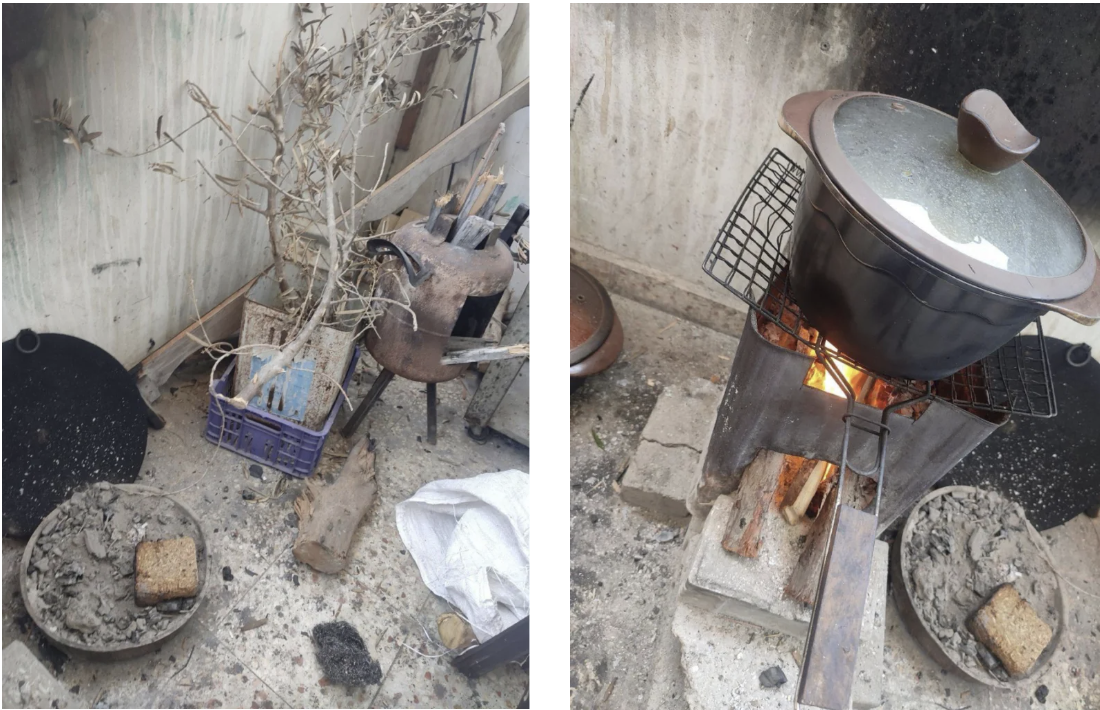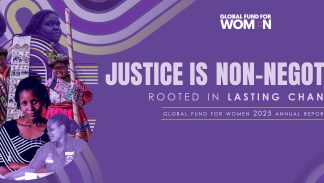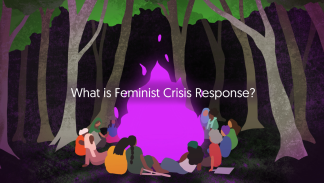On the Ground in Palestine: Stories of Justice, Healing, and Accountability
For the past year, there has been abhorrent civilian violence and destruction across Gaza, Lebanon, and Israel. We loudly join our partners’ collective call for safety, dignity, and freedom: this includes protection from genocide and an immediate ceasefire.
Even as ongoing military attacks intensify, grassroots feminist organizations in Palestine are leading with creativity, resilience, and courage. They are standing with their communities to save lives and create sustainable futures. We must stand with them today. Here are some of their stories.
Documenting stories of resilience
“How can I think about how I am feeling when I am starving?”Anonymous Palestinian artist
Shashat Woman Cinema is a Ramallah-based NGO founded in 2005. Last year, its Gaza office was bombed and many of its filmmakers have lost homes and loved ones. Yet their work continues. Shashat provides cash assistance, psycho-social aid, and essential resources to support filmmaker families through displacement, trauma, and severe shortages of essentials like food and medicine.
In the West Bank, they offer martial arts and rights awareness training for adolescent girls, addressing issues like school dropouts and gender-based violence. The organization also supplies menstrual hygiene products to girls impacted by the war. Despite the devastation, many filmmakers supported by Shashat are turning their experiences into creative expression, hoping to document their stories of resilience through future films.
“How many times have Palestinians been forcibly displaced? Our photographer was shot when he was holding his 4-years-old daughter. Why do we have to live through this?”Shashat staff member

“A young woman filmmaker in the famine north. I want to run away from all this to anything, to any meaning that can hold the weight of my feelings. I need a reality other than the one which kills all feelings of life inside me day by day. I need to run away from all these uncertainties to a certainty. A certainty I know after it where my footsteps will fall. I need a map, not a maze. I am forgetting who I am.”Anonymous artist from Shashat network
Amplifying the voices of Palestinian women
Amid the ongoing war in Gaza, Nisaa FM, a local radio station is empowering female journalists and offering essential support through mental health and crisis reporting training programs. These initiatives equip journalists with skills for conflict reporting while providing crucial mental health mentoring, particularly for recent graduates.
Since October, the broadcast radio station has become a critical source of reliable information as other media outlets have shut down. They are empowering a new generation of Palestinian journalists.
Among them is S*, who lost her husband in the war and became her family's sole provider. With the Nisaa FM’s support, she continued her media work, reporting on the struggles of women in Gaza.
"I am deeply grateful for the support I received from the radio, which enabled me to generate income, achieve independence, and amplify the voices of Palestinian women. This opportunity not only empowered me but also helped me cope with the ongoing crisis by allowing me to contribute meaningfully to our community's narrative."Quote from S* (Name has been modified for safety and to respect her privacy)
This year, Palestinian journalists have shown immense bravery, reporting live on the genocide, while many of their colleagues were tragically killed in the line of duty. Global Fund for Women is proud to support Nisaa FM, empowering female journalists to continue ethical journalism, shedding light on the lives of Palestinians, and ensuring their stories are heard.
Food Sovereignty in Gaza
The Local Seed Bank was started by farmers and gardeners seeking to overcome the effects of climate change in Palestine. Local seeds, such as wheat, barley, and okra, are resilient and provide income for many families. Located in the fertile region of Khan Younis, the Seed Bank has expanded to cover all of Gaza, preserving, renewing, and distributing seeds every season.
The Seed Bank features a solar-powered facility for drying and storing seeds, ensuring quality despite Gaza’s unreliable electricity supply. The devastating war on Gaza led to the complete destruction and leveling of the Local Seed Bank, as well as the surrounding agricultural lands and farmers' homes. It also forced farmers and residents to flee to the Deir al-Balah area. Despite this, farmers like founder Henadi Mahna revived the project, replanting seeds and continuing their mission of food sovereignty, with landowners offering space to grow various crops.
The initiative has partnered with agricultural organizations to distribute seeds to displaced women, helping them gain resilience and income. Even with limited resources, seeds have reached northern Gaza, where food scarcity is severe and delivery is challenging in a context of war. The initiative remains resilient, fighting, and producing while maintaining its identity and sovereignty, believing that the land deserves life and that dreams continue.


